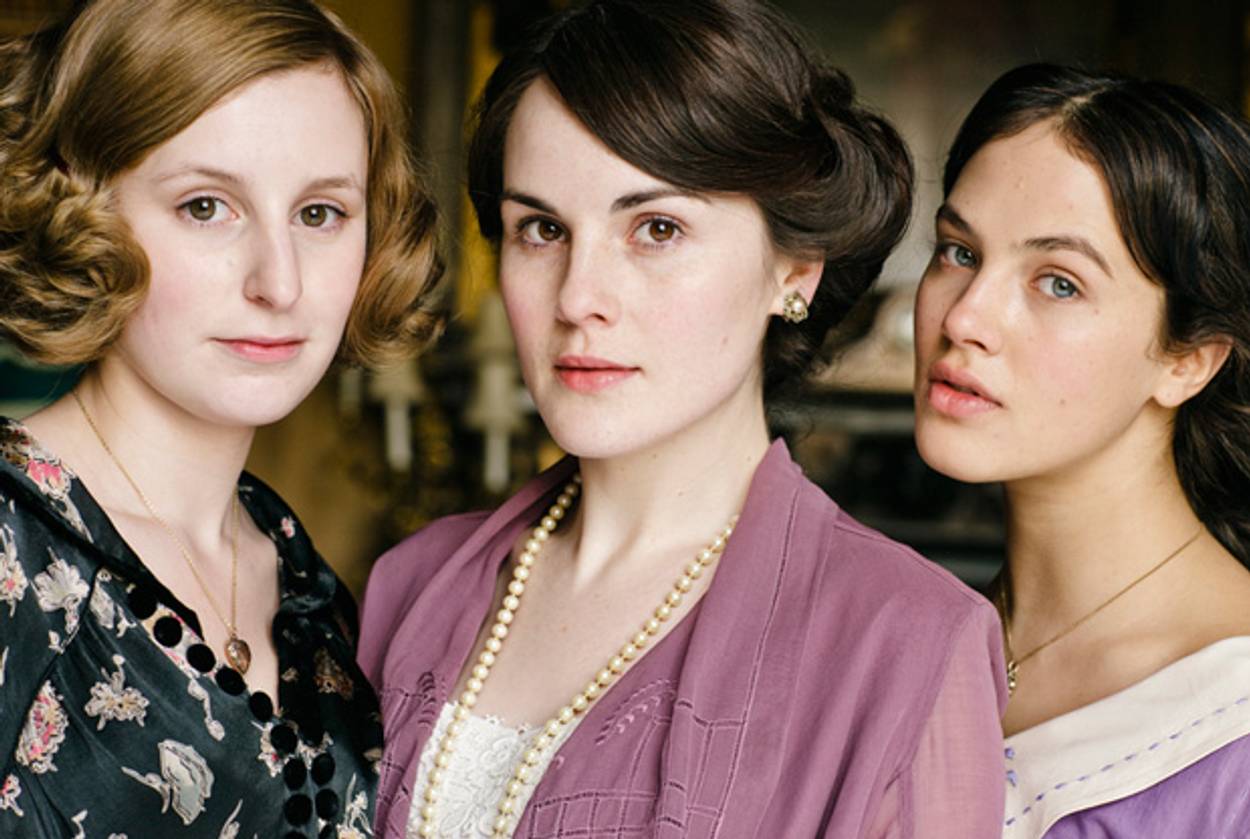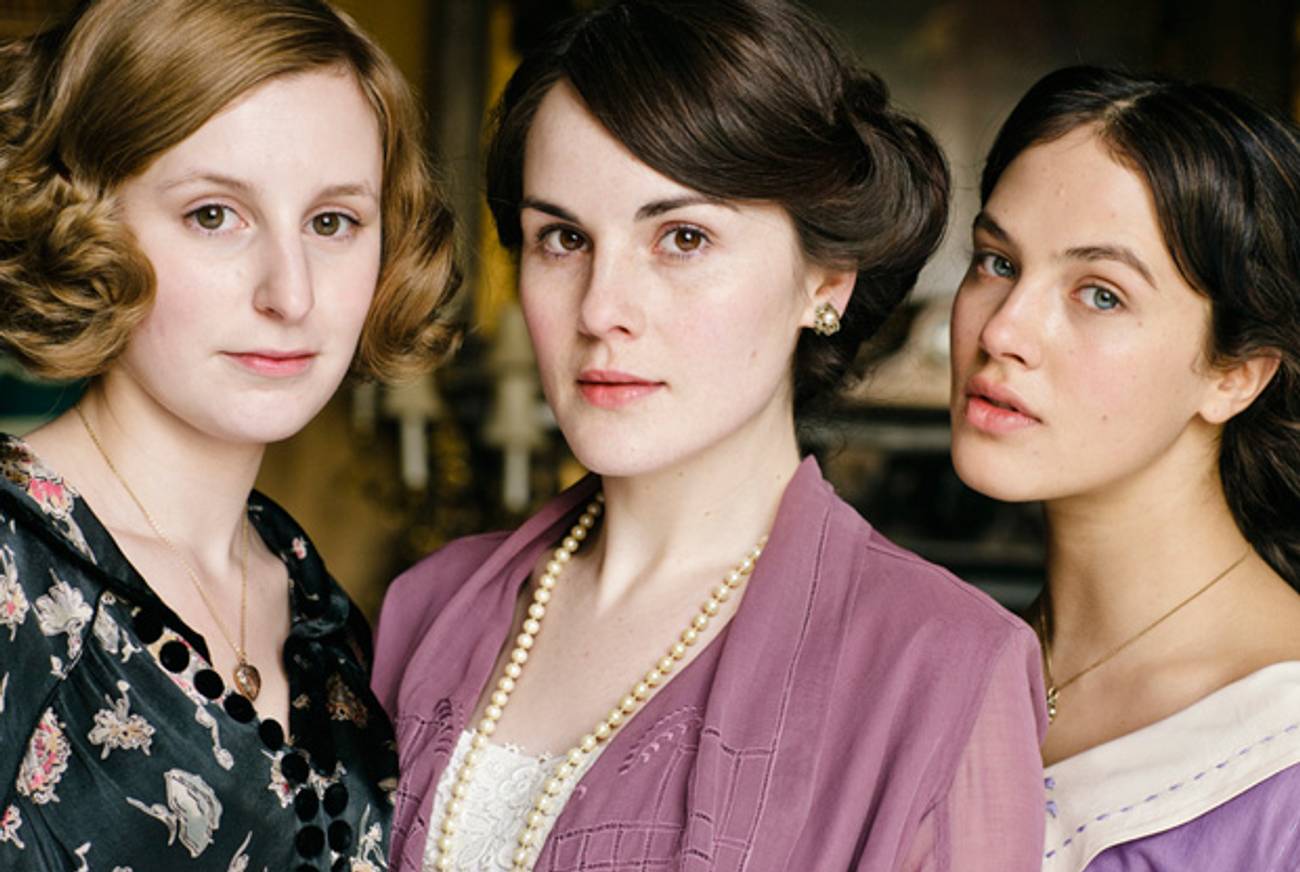The Aristocrats
The upper-crust Edwardians of Downton Abbey, now back on PBS, are as bound by tradition as the shtetl Jews of Fiddler on the Roof




The patriarchs of the 1960s musical Fiddler on the Roof and of the posh British television series Downton Abbey share a very deep and most unlikely kinship. While Downton’s Lord Grantham would never be caught singing “If I Were a Rich Man” from the scaffolds of a chicken coop, his urgent desire to stay true to convention while struggling to raise three daughters of marriageable age in pre-war Europe binds him to the father-figure of Tevye, who proudly bellows, “Tradition, tradition!” in the famous musical inspired by Sholem Aleichem’s book, Tevye and His Daughters. As political discord begins to bleed into the domestic sphere, both men are forced to deal with their daughters’ decisions to question societal custom and, God forbid, marry for love instead of in accordance with familial expectation.
Fiddler on the Roof takes us back to a time when tradition dictated all aspects of life and every man, woman, and child was taught to accept his or her lot. Downton Abbey, which is set in the late Edwardian era just before the outbreak of World War I, and supported by Oscar-winning writer Julian Fellowes’ captivating storylines, strikes quite similar notes and, like the Yiddish-accented musical with which it might superficially appear to have nothing in common, has quickly gained a global following. (The second season began airing in the United States Sunday on PBS; the show previously aired in the U.K., and this article contains spoilers.) As inheritors of the Downton estate, Lord Grantham and his daughters are also bound to propriety and established custom, born into a wealthy lifestyle that proves to have as many restraints as an impoverished one.
Tevye and Lord Grantham each pressure their eldest daughters, Tzeitel and Lady Mary, respectively, to marry men of their choosing—and to do so with haste. Having failed to father a son, Lord Grantham expects his firstborn to wed the heir to his estate so that she may inherit the property and keep it within the family. Tevye, a poor milkman with no dowry to hand down to his daughter, adopts a similar strategy, believing that the best way to ensure Tzeitel’s comfort and happiness is to marry her off to a man far wealthier than himself.
Tzeitel cautiously resists the man of her father’s choosing, the wealthy, widowed butcher Lazar Wolf. Finally unwilling to enter a loveless marriage for the sake of financial comfort, Tzeitel plans to marry her true love, Motel, a self-made tailor who is determined to prove to Tevye that he can work hard to support Tzeitel and a future family. Similarly, in Downton, Mary finds love with Matthew Crawley, a distant cousin and professional-class solicitor, who eventually earns the respect of the Downton residents and, much to the lady’s surprise, successfully chisels through the hardened exterior of Lord Grantham’s eldest daughter. As the entail to the estate, Matthew is the parents’ obvious choice for Mary, but through various complications, it takes the length of a war for the young lovers to ultimately unite.
Aided by the persuasive tactics of their mothers, as well as certain fortuitous events, Tevye and Lord Grantham both ultimately feel the effects of war and are prompted to bend the rules slightly for the sake of their families. It should also be noted that the supernatural plays a quirky role in sealing the fate of these two couples. Communication with the deceased occurs in a dream sequence in Fiddler and through a Ouija board in Downton.
However, the younger sisters don’t get off that easy. While Tevye and Lord Grantham make concessions for their eldest daughters, watching their young ones abandon all sacred convention is intolerable. Chava and Lady Sybil each determine to marry men completely outside their worlds and are willing to brave terrible repercussions for their choices. Chava weds Fyedka, a Christian, while Sybil seeks to wed Tom Branson, an Irish socialist who also happens to be the family’s chauffeur. Each relationship is also sparked by an intellectual exchange, with Fyedka offering Chava a book and Branson offering Sybil a political pamphlet. If a friendship that crosses the boundaries of faith or class would be frowned upon, the young lovebirds must understand that marriage would be unthinkable.
“A bird may love a fish,” Tevye says, “but where would they build a home together?” Tevye literally turns his back on Chava, casting her away from the family, with only strength enough to mutter, “God be with you.” While Lord Grantham eventually grants Sybil and Branson his blessing, a heartbreaking rendition of “Little bird, little Chaveleh,” wouldn’t be uncalled for as he watches his youngest daughter slipping away from the life he worked to provide for her. Neither Tevye nor Lord Grantham attends his daughter’s wedding.
After witnessing how strongly their children value the impulses of the heart, both fathers are prompted to question the foundations of their own marriages. In an endearing exchange, we learn that Lord and Lady Grantham wound up very much in love, although Lord Grantham initially married the lady for her money, which he used to maintain the upkeep of the estate. This scene mirrors Fiddler’s famous duet, “Do You Love Me?” in which Tevye and Golde reflect upon their arranged marriage and the love that they grew to feel for each other.
The fictional settings of Anatevka and Downton each play vital roles in the families’ lives, and neither residence escapes the war unscathed. The Russian shtetl and the English estate each act as additional characters in their respective stories, constantly reinforcing the traditions that Tevye and Lord Grantham fight to uphold.
Regardless of whether there is even an ounce of Jewish blood involved in the creation of Downton Abbey, it must not go unmentioned that Maggie Smith’s glorious portrayal of Granny, the Dowager Countess, is the closest thing to a Christian Yente that I’ve ever seen and easily a match for the most sharp-tongued and determined shtetl matchmaker.
Amanda Walgrove is an editorial assistant at The Faster Times. She has written for Lilith Magazine and Moment Magazine.
Amanda Walgrove is an editorial assistant at The Faster Times. She has written for Lilith Magazine and Moment Magazine.